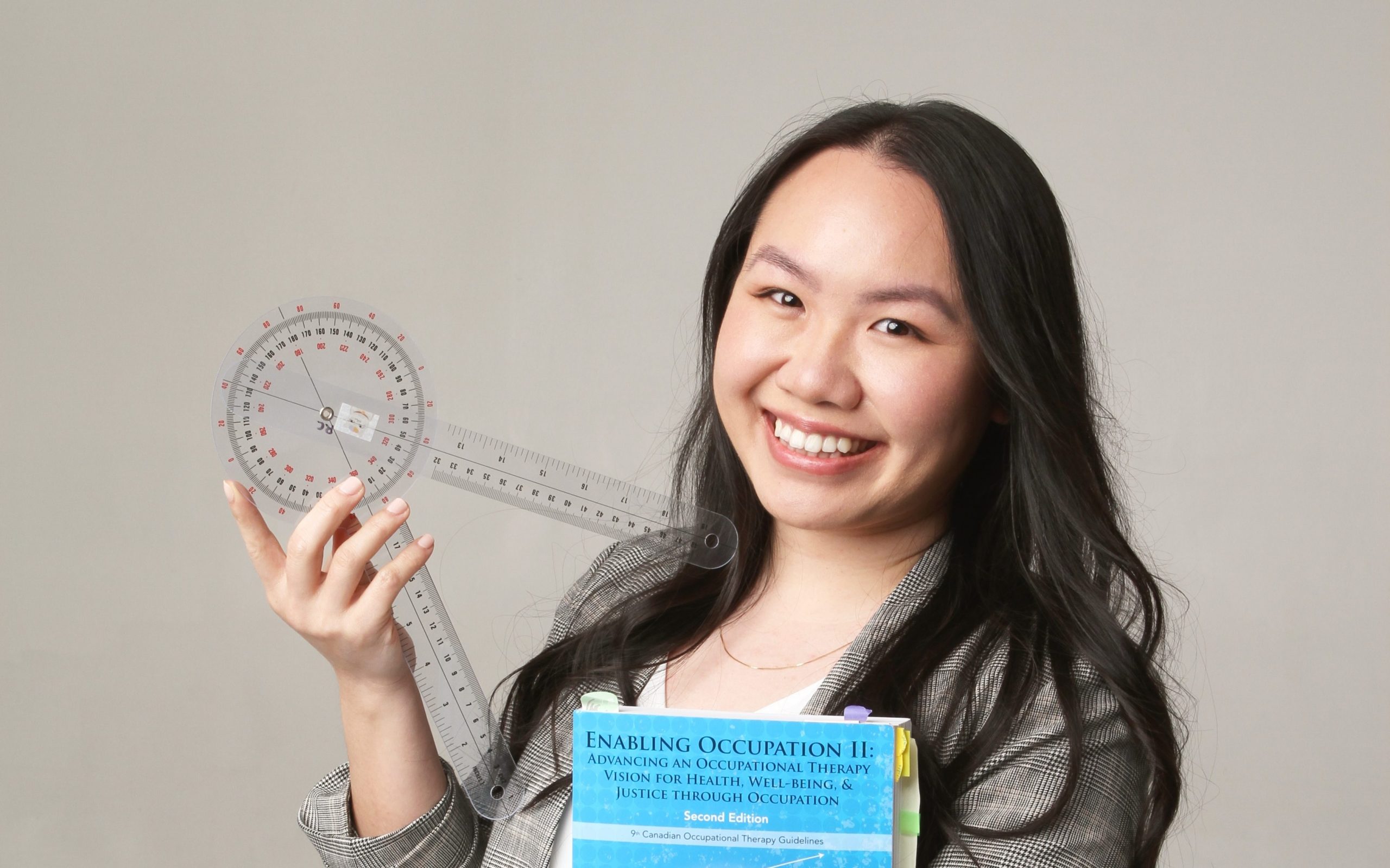

Rosemary Cheung (MOT 2020) joined us recently to discuss her transition from the program into practice. In our interview, she emphasized the value of mentorship, described the process of acquiring new clinical skills as a recent graduate, and shared her advice for choosing one’s first ever position in the field.
How did you find your current position, and what made you choose it?
I found out about my current role at a yearly job fair that the UBC Student Society for OT and PT holds, where representatives of different companies and health authorities come to chat with current students about the practice areas they service. I went to a lot of different booths to see what each company was like, and I found that I connected with a private practice clinic that serviced the community, particularly supporting those who had sustained in motor vehicle or workplace injuries. Working in private practice, we often work independently without having other colleagues or the rest of the healthcare team nearby, which may sometimes feel isolating. However, this clinic that I connected with had a small clinic vibe but was also part of a bigger organization which offered ample resources and support, which I valued. After the job fair, they contacted me, and our mutual feeling was that it would be a good fit for me to start out as a new graduate.
After this initial conversation, I consulted other working clinicians and preceptors about my options. Initially, I thought that I would go straight into working in paediatrics, but, since I never got the opportunity to trial private practice and community work on my fieldwork placements, I thought this would be a good time in my career to try it out. I knew, despite the unfamiliarity of the practice area, that when we graduate, we graduate with the skills to be flexible and transferable to serve many different populations, which is a big factor in why I wanted to become an OT.
I heard back from private practices fairly quickly, so, with the offers I got, I weighed the pros and cons of each one, such as what resources would be available and how much mentorship they offered. I have to admit that it was an overwhelming process, because I wanted to make the right decision. I took my time to figure out which offer would be the best fit for me, and, considering the professional development, support, and opportunities to grow, both as a clinician and in leadership, I took this one. Recently, they let me mentor a student just seven months after I started this position, and I really value the fact that they trusted me and were willing to give me these experiences despite my still being new to the role!
What were the first few months in your first position like?
There was a lot to take in during my first few months here. I hadn’t done any placements in private or community care, so it was a completely new environment for me. My responsibilities include going into clients’ homes and assessing accessibility and safety, along with getting a good baseline of what their current injuries are, whether they are physical, cognitive, or psychosocial, and developing a client-centered plan to support my clients with their recovery. The largest learning curve for me was navigating different funders, such as ICBC and WSBC, juggling and scheduling my own caseload, and being creative in delivering interventions in the community. What made the process of adjusting to a new role less intimidating was having a mentor with whom I was able to connect anytime and have scheduled weekly meetings to make sure that I was on the right track.
I felt vulnerable when I was opening up to my mentor about the challenges and difficulties I was facing with trying to get a good handle on providing good client care along with learning new assessments and interventions when I encountered practice areas that I hadn’t worked with in the past while also juggling other work demands such as report writing. My mentor often reminds me: “You’re still learning, but you are on the right path!” Hearing these words makes me feel validated that I am on the right path as I grow as a new OT in my practice. Chances are, we are going to make mistakes along the way, even as experienced clinicians, so it is best to give yourself grace, learn from the mistakes, not be too hard on yourself, and know that as long as you’re working hard at it, then you are on the right path.
How did your coursework and fieldwork placements prepare you for clinical work?
I knew that I wouldn’t know everything upon graduation, since they told us both in our classwork and on placements that we would learn the most while on the job. I think that my ability to adapt came from the different experiences that they gave us during fieldwork: we had a lot of hands-on practice and face-to-face communication, which made me really comfortable working with clients, and we spent a lot of time building those skills to problem-solve, be flexible, and think quickly on our feet, all of which have come in handy in my clinical work.
I remember that Katie once told us that she didn’t like theory initially, but it helped her so much with her clinical reasoning and practice that she ended up growing a fond appreciation for it. I too had the same reaction to theory as Katie. In the first month of work, I quickly realized how incredibly important and helpful those theoretic frameworks were, especially when developing client-centred interventions, to ensure that I was grounding everything in occupation, as it is a keystone to effective treatments for our clients as OTs.
Did anything in particular surprise you about the transition into the profession?
I went in thinking that I wouldn’t be supported, because I’d heard some negative experiences from recent graduates in private practice who hadn’t gotten a lot of support and were sometimes just expected to jump right in and perform. Instead, I’ve had a lot of great support, including weekly meetings with my mentor to discuss navigating a lot of unique situations, working with difficult funders, and coordinating complex treatments. Something as simple as a quick check-in or being available to chat by text can make a huge difference. Despite my having moments of imposter syndrome, having a mentor and supportive colleagues has made all the difference in building up my confidence in my practice.
What major challenges have you faced, and how have you overcome them?
The biggest challenge for me has been having to know so many different areas of OT. When I first started, I only knew a little bit in each area, because there’s only so much that you can cover during the program, so I’ve been slowly building up my toolbox with the help of my mentor. There are so many resources and different assessments that you can do, and it can be hard to determine which one is the most appropriate. You have to be OK with not knowing whether you’ve done the best assessment and to remind yourself that you’ll eventually learn to do it better.
On an emotional level, I struggle with feeling that I’m not doing enough for my clients. As a new grad, I know I don’t have all the answers or enough experience to determine the best treatment or next step in every situation, and I’ve had to practise being vulnerable with my mentor and honest about my limitations. Mistakes do happen, and I’ve been grateful to have been able to communicate that with my mentor and work together on solutions. Reflecting on my practice and each client interaction has allowed me to pinpoint areas that I need to continue to work on as well as areas where I am strong.
What have the greatest joys of clinical practice been?
The joys of my positions have included seeing my clients make progress in their occupational journeys. I work with people who have been in motor vehicle accidents or had workplace injuries, and to see them return to meaningful activities and tell me that they are grateful to have had me walk with them through this journey makes my work feel so rewarding. I try my best to create space for my clients to feel heard and ensure that our time together is catered to supporting them back to their meaningful occupations.
What advice would you give current MOT students about their time in the program and the start of their careers as OTs?
My advice to current students would be to really enjoy the process. Being in school is stressful, and I know it’s easy to get caught up in getting good grades, but I would encourage people not to stress about the little things that won’t make them better clinicians in the end. You’re going to make mistakes and learn from them; that’s all just part of the process.
There are a lot of job opportunities and different practice areas, and it’s perfectly OK to try out multiple jobs while you’re figuring out what works for you; a lot of new grads do that. Looking back, when I was considering my options, any of my choices would’ve been great. Each position would have taught me something different, and they all had their pros and cons. There are always other opportunities out there, so try to put less pressure on yourself to make the right choice.
Finally, I would recommend that you stay connected with your peers. You’re all facing your own learning curves and trying out new jobs, and it helps to know that everyone’s going through the same thing. Peer support shows you that you’re not the only one on this boat, and, with everyone working from home, it’s especially important to stay connected. I found that talking to other recent graduates was a big help with the transition from the program into practice. With that being said, feel free to reach out to me anytime, and good luck. You got this!
Do you have any questions for recent MOT graduates? Keep an eye out for our interviews with other alumni of the program as they navigate their first few years of practice in the profession.